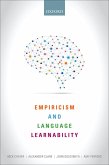In
The Human Factor, Kim Vicente coined the term 'Human-tech' to describe a more encompassing and ambitious approach to the study of Human-Technology Interaction (HTI) than is now evident in any of its participating disciplines, such as human factors, human-computer interaction, cognitive science and engineering, industrial design, informatics or applied psychology. Observing that the way forward is 'not by widgets alone,' Vicente's Human-tech approach addresses every level--physical, psychological, team, organizational, and political--at which technology impacts quality of life, identifies a human or societal need, and then tailors technology to what we know about human nature at that level.
The Human Factor was written for a broad audience, in part to educate general readers beyond the HTI community about the need to think seriously about the tremendous impact that poorly designed technology can have, ranging from user frustration to the tragic loss of human life. The articles collected in this book provide much of the technical material behind the work that was presented in
The Human Factor, and the commentaries by Alex Kirlik situate these articles in their broader historical, scientific and ethical context. This collection of articles and commentaries forms a set of recommendations for how HTI research ought to broaden both its perspective and its practical, even ethical, aspirations to meet the increasingly complicated challenges of designing technology to support human work, to improve quality of life, and to design the way will live with technology. As the first book both to integrate the theory and research underlying Human-tech, and to clearly delineate the scientific challenges and ethical responsibilities that await those who either design technology for human use, or design technology that influences or even structures the working or daily lives of others,
Human-tech: Ethical and Scientific Foundations will appeal to the broad range of students and scholars in all of the HTI disciplines.
Dieser Download kann aus rechtlichen Gründen nur mit Rechnungsadresse in A, B, BG, CY, CZ, D, DK, EW, E, FIN, F, GR, HR, H, IRL, I, LT, L, LR, M, NL, PL, P, R, S, SLO, SK ausgeliefert werden.
Hinweis: Dieser Artikel kann nur an eine deutsche Lieferadresse ausgeliefert werden.









